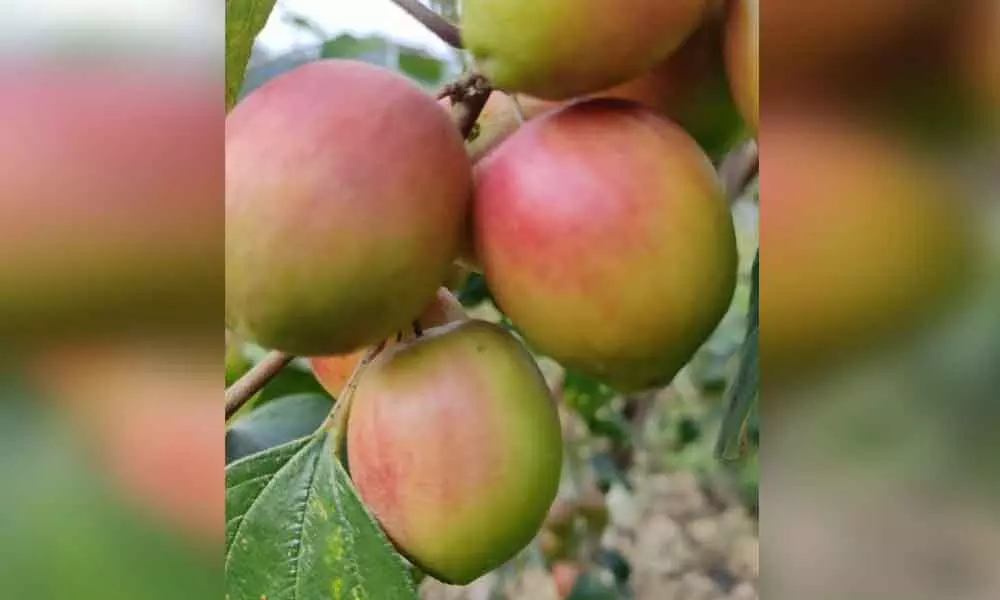Live
- Allu Arjun meets his uncle Nagababu at his residence
- J&K L-G felicitates Langar organisations & NGOs for contribution during Amarnath Yatra
- Hit by Covid, MP's Rakesh Mishra sees revival of his fortunes, courtesy PM SVANidhi scheme
- Trailblazing Yakshagana Artiste Leelavathi Baipaditthaya No More
- Cong in direct fight with BJP on 45-50 seats in Delhi Assembly election: Sandeep Dikshit
- Vijay Diwas: Assam Rifles organises Half Marathon in Tripura
- Delhi HC to hear on Monday plea against suppression of CAG reports by CM Atishi
- Collaboration, innovation, PPP key to achieve 2047 goals: Jitendra Singh
- Portraits of National Leaders to be Unveiled in Karnataka Assembly Hall
- Kejriwal's claims on vision for development ridiculous: Delhi BJP
Just In
Caught in Covid crisis, Tripura tribals grow Apple Ber, first in NE region


Tripura tribals grow Apple Ber, first in NE region
Hit by the economic crisis triggered by the Covid-19 pandemic and enthused by a tribal youth, some tribal farmers in Tripura are scripting a new story by cultivating Apple Ber, a variety of horticultural fruit. It is being done for the first time in the entire northeastern region.
Hit by the economic crisis triggered by the Covid-19 pandemic and enthused by a tribal youth, some tribal farmers in Tripura are scripting a new story by cultivating Apple Ber, a variety of horticultural fruit. It is being done for the first time in the entire northeastern region.
Bikramjit Chakma in northern Tripura's Pencharthal encouraged his relatives to cultivate two varieties of Apple Ber -- Sinduri Apple Ber and Kashmiri Apple Ber on their lands instead of the traditional horticultural crops.
"Many tribals in Tripura for the past many years are cultivating rubber while many others are doing unscientific 'jhum' cultivation (slash and burn method of cultivation). Some tribals are cultivating traditional horticultural crops and some are doing betel nut.
"But rubber and betel nut take several years to give financial benefits. But from Apple Ber, anyone can get financial gains within a year or so," the 32-year-old told IANS.
He said that he convinced some of his relatives that instead of potato, brinjal, 'patal' (pointed gourd), cucumber, tomato and other horticultural crops they should cultivate different varieties of Apple Ber for easy profits.
They could also avoid other problems like storage, transportation and marketing.
"My relatives, influenced by my proposals, agreed and last year started cultivating the two varieties of Apple Ber -- Sinduri Apple Ber and Kashmiri Apple Ber.
"I helped them to collect the saplings of the Sinduri Apple Ber and Kashmiri Apple Ber from outside the state," said Chakma, who got his Bachelor of Arts degree from a Tripura college in 2011 and is now in a government job.
When asked how he came to know about the cultivation of Apple Ber and to make profits by marketing the crop, he said: "During my internet chats in the Covid induced lockdown period, I found out about these varieties of produce in various government and non-government websites.
"I have also found that these crops are not only being cultivated in Kashmir but also in northern Indian states and in neighbouring Bangladesh with very good yields. If these are grown outside Jammu and Kashmir and in a high tropical atmosphere, why not in Tripura? Then I, along with my relatives, started an experiment last year which yielded good results within a year."
Tripura Chief Minister Biplab Kumar Deb was also impressed by what Chakma and his relatves were doing.
"Bikramjit and his relatives earned a profit of Rs 6 lakhs in a year by cultivating the two varieties of Apple Ber in a little over two acres of land," Deb said.
The Chief Minister said that Bikramjit and his relatives' success would encourage others in Tripura and the other northeastern states to become self-reliant and to be an employer.
According to the officials of the Tripura Horticulture Department, Bikramjit and his relatives' efforts have written a new chapter in Apple Ber cultivation, not just in Tripura, but in the entire northeastern region comprising eight states.
The specialties of the Sinduri Apple Ber and Kashmiri Apple Ber, both hybrid varieties, is the size of the fruit which are bigger than other varieties, taste very sweet, are drought resistant, consume less water and require less insecticides. They are sustainable in hot temperature too, an official of the Horticulture Department said.
Agricultural expert Sekhar Paul said that Sinduri Apple Ber and Kashmiri Apple Ber are rich in vitamins, and have medicinal value for pregnant and lactating women.
"These varieties of the Apple Bers have minerals such as calcium, phosphorus and iron. Ber is considered the fruit of the poor and is available in many varieties. These varieties of bers were found in Thailand and Malaysia and other countries," Paul told IANS.
He said farmers could earn good returns by farming these varieties of Ber without much investment and hard work. (IANS)

© 2024 Hyderabad Media House Limited/The Hans India. All rights reserved. Powered by hocalwire.com






